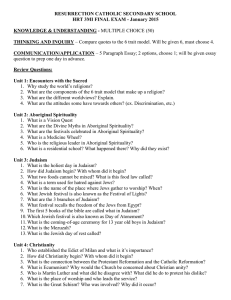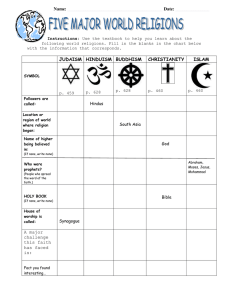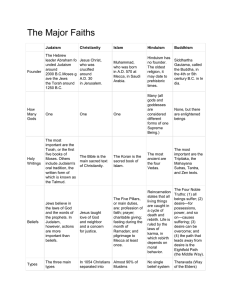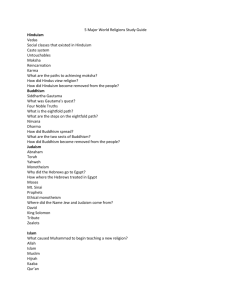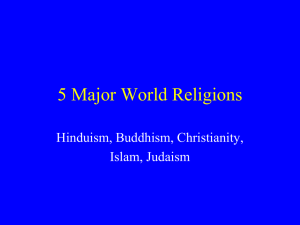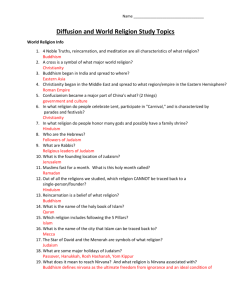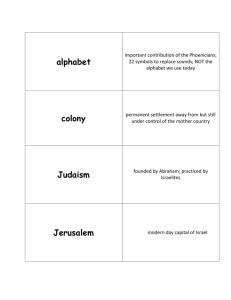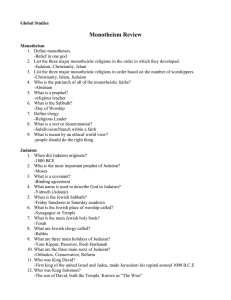World Religions
advertisement
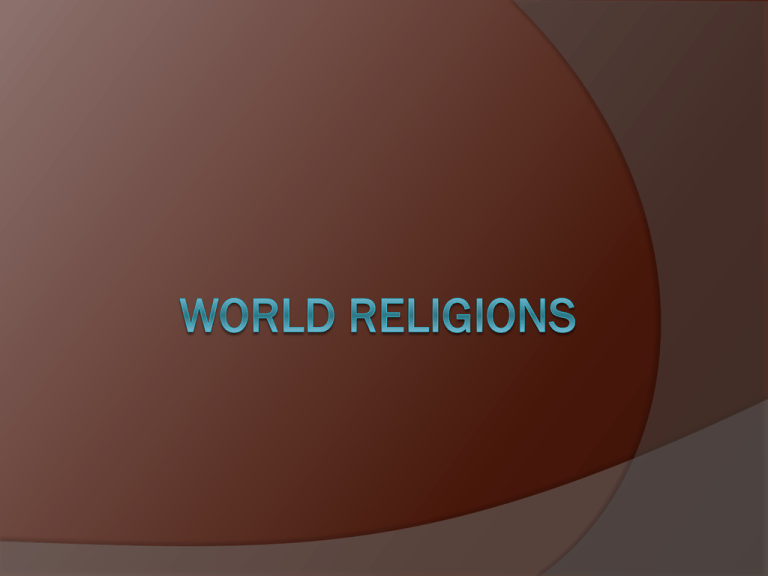
Hinduism One of the world's oldest religions. No known founder Composed of many different beliefs Originated around 1500 B.C.E. in India Polytheism – belief in many gods Hinduism Hindus believe in many gods, numbering into the thousands. They recognize one supreme spirit called Brahman (the Absolute) which resides in all things. Some other gods include Brahma,Vishnu and Shiva The goal of Hindus is to someday join with Brahman. Until that union takes place, believers are in a continuous process of rebirth called reincarnation. Follow dharma, the moral laws Practice meditation Hinduism has many sacred books, the oldest being a series called the Vedas. Shiva Vishnu Brahma Buddhism Founding person of Buddhism is Siddhartha Guatama, the Buddha Based on major principles of Hinduism Life, death, rebirth Karma meditation Major difference from Hinduism is that one’s goal is to reach enlightenment to break cycle, or nirvana Does not focus on the many gods but instead focuses on every piece of the universe being one ( or a whole) Buddhism Major philosophy is based on Buddha’s Four Noble Truths Buddhism is a major religion in China, Japan, India, and Tibet. The Dalai Lama is a Buddhist monk who remains the leader of the Tibetans. Judaism Believe in God Father of the Jews was Abraham who was born around 2000 B.C.E in Mesopotamia One of the first to believe there was single superior being Later Moses became a major leader in the religion Led Hebrews out from Egypt Was given the Ten Commandments by God Judaism Jews think that God will send a Messiah (a deliverer) to unite them and lead them in His way. Christians believe that Jesus was the Messiah. The Jewish people do not agree; they anticipate His arrival in the future. Judaism teaches that death is not the end and that there is a world to come (heaven). Judaism The Torah, the first five books of the Hebrew Bible, is the most important Jewish scripture. It contains the basic laws of Judaism. Another important book is the Talmud, serving primarily as a guide to the civil and religious laws of Judaism. Hebrew is the original language Judaism helped develop two other major religions: Christianity and Islam. Judaism The Jewish house of worship is called a synagogue. Rabbis (spiritual leaders) conduct services, act as interpreters of Jewish laws, and deliver sermons. Some names given to God were Yahweh and Elohim Today there are over 18 million followers of Judaism scattered throughout the world. A large number of those people live in the Jewish nation of Israel. Over six million live in the United States. Christianity The early Hebrews who eventually developed into the Jewish religion became the foundation of Christianity. Jesus, or the Messiah, was a Jewish boy who disagreed with some of the Jewish principles of his day began to profess a new way of thinking. This eventually led to the beginning of the Christian religion. Christianity Christianity started about 2000 years ago about the same time of Jesus. The central point of Christian belief is the trinity: God, the Father, entered into human history as the Son, Jesus of Nazereth, and arose as the Holy Spirit. Original languages of Christianity are Aramaic and Greek Christian Philosophy God is the Creator of the universe. There is one God, Who is Three PersonsFather, Son and Holy Spirit. Jesus is both fully man and fully God. He was born of the Virgin Mary Crucified, resurrected from the dead, and ascended to the Father. Christian Philosophy Sin and Evil are realities in our existence. The Bible is the Holy Book that records God's revelation. Old and New Testaments All believers are promised life everlasting. The leader of Christianity was Jesus, and the followers was his 12 disciples. Islam Islam is the name given to the religion preached by the prophet Muhammad in the 600s A.D. The Islamic religion started in the area known as Palestine in the year 600 A.D. It has about 850 million followers, most of them in the region north and east of the Mediterranean Sea. Islam The holy book of Islam is the Koran. Muslims believe its words to be those of Allah himself, spoken to Muhammad by an angel. Allah, is the Islamic God. Must pray to him 5 times a day People who believe these ideas are called Muslims. Original language is Arabic Islamic Philosophy Muslims learn that life on earth is a period of testing and preparation for the life to come. Angels record good and bad deeds. People should behave themselves and help others, trusting in Allah's justice and mercy for their reward. Islam Muslims pray five times daily in their mosques (churches). While praying, they face the holy city of Mecca (in Saudi-Arabia) and sometimes kneel with faces to the ground. All Muslims are required to make a pilgrimage (trip to a sacred place) to Mecca at least once in their lifetime.


